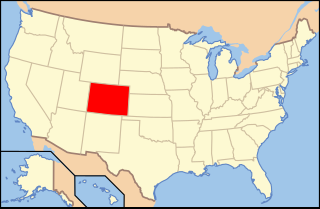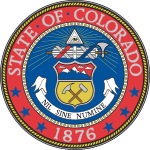Same-sex marriage in Florida has been legal since January 6, 2015, as a result of a ruling in Brenner v. Scott from the U.S. District Court for the Northern District of Florida. The court ruled the state's same-sex marriage ban unconstitutional on August 21, 2014. The order was stayed temporarily. State attempts at extending the stay failed, with the U.S. Supreme Court denying further extension on December 19, 2014. In addition, a state court ruling in Pareto v. Ruvin allowed same-sex couples to obtain marriage licenses in Miami-Dade County on the afternoon of January 5, 2015. In another state case challenging the state's denial of marriage rights to same-sex couples, a Monroe County court in Huntsman v. Heavilin stayed enforcement of its decision pending appeal and the stay expired on January 6, 2015.
Same-sex marriage in Colorado has been legally recognized since October 7, 2014. Colorado's state constitutional ban on same-sex marriage was struck down in state district court on July 9, 2014, and by the U.S. District Court for the District of Colorado on July 23, 2014. The Tenth Circuit Court of Appeals had already made similar rulings with respect to such bans in Utah on June 25 and Oklahoma on July 18, which are binding precedents on courts in Colorado. On October 6, 2014, the U.S. Supreme Court declined to hear the Tenth Circuit cases, and the Tenth Circuit lifted its stay. On October 7, 2014, the Colorado Supreme Court and the Tenth Circuit cleared the way for same-sex marriages to begin in Colorado.
Same-sex marriage in Utah has been legal since October 6, 2014. On December 20, 2013, the state began issuing marriage licenses to same-sex couples as a result of the U.S. District Court for the District of Utah's ruling in the case of Kitchen v. Herbert, which found that barring same-sex couples from marriage violates the U.S. Constitution. The issuance of those licenses was halted during the period of January 6, 2014 until October 6, 2014, following the resolution of a lawsuit challenging the state's ban on same-sex marriage. On that day, following the U.S. Supreme Court's refusal to hear an appeal in a case that found Utah's ban on same-sex marriage unconstitutional, the Tenth Circuit Court of Appeals ordered the state to recognize same-sex marriage.

Lesbian, gay, bisexual, and transgender (LGBT) persons in the U.S. state of Colorado enjoy most of the same rights as non-LGBT people. Same-sex sexual activity has been legal in Colorado since 1972. Same-sex marriage has been recognized since October 2014, and the state enacted civil unions in 2013, which provide some of the rights and benefits of marriage. State law also prohibits discrimination on account of sexual orientation and gender identity in employment, housing and public accommodations and the use of conversion therapy on minors. In July 2020, Colorado became the 11th US state to abolish the gay panic defense.
This article contains a timeline of significant events regarding same-sex marriage in the United States. On June 26, 2015, the landmark US Supreme Court decision in Obergefell v. Hodges effectively ended restrictions on same-sex marriage in the United States.
Same-sex marriage in Nebraska has been legally recognized since June 26, 2015, when the U.S. Supreme Court ruled in the case of Obergefell v. Hodges that the denial of marriage rights to same-sex couples violates the Fourteenth Amendment. Following the court ruling, the Attorney General, Doug Peterson, announced that the state of Nebraska would comply and recognize same-sex marriages.
Same-sex marriage in Kansas became legal following the U.S. Supreme Court's decision in Obergefell v. Hodges on June 26, 2015, which found the denial of marriage rights to same-sex couples unconstitutional. By June 30, all 31 judicial districts and all 105 Kansas counties were issuing marriage licenses to same-sex couples or had agreed to do so. Kansas state agencies initially delayed recognition of same-sex marriages for purposes including but not limited to changing names, ascribing health benefits and filing joint tax returns, but began doing so on July 6.

Kitchen v. Herbert, 961 F.Supp.2d 1181, affirmed, 755 F.3d 1193 ; stay granted, 134 S.Ct. 893 (2014); petition for certiorari denied, No. 14-124, 2014 WL 3841263, is the federal case that successfully challenged Utah's constitutional ban on marriage for same-sex couples and similar statutes. Three same-sex couples filed suit in March 2013, naming as defendants Utah Governor Gary R. Herbert, Attorney General John Swallow, and Salt Lake County Clerk Sherrie Swensen in their official capacities.
This is a list of notable events in the history of LGBT rights that took place in the year 2014.
Same-sex marriage in Kentucky has been legal since the U.S. Supreme Court's ruling in Obergefell v. Hodges on June 26, 2015. The decision, which struck down Kentucky's statutory and constitutional bans on same-sex marriages, was handed down on June 26, 2015, and Governor Steve Beshear and Attorney General Jack Conway announced almost immediately that the court's order would be implemented.
Same-sex marriage in Mississippi has been legal since June 26, 2015. On November 25, 2014, U.S. District Court Judge Carlton W. Reeves of the U.S. District Court for the Southern District of Mississippi ruled that Mississippi's ban on same-sex marriage was unconstitutional. Enforcement of his ruling was stayed pending appeal to the Fifth Circuit Court of Appeals. On June 26, 2015, the U.S. Supreme Court ruled in Obergefell v. Hodges that the denial of marriage rights to same-sex couples is unconstitutional under the U.S. Constitution. On June 29, Attorney General Jim Hood ordered clerks to comply with the court ruling and issue marriage licenses to same-sex couples. The Fifth Circuit lifted its stay on July 1, and Judge Reeves ordered an end to Mississippi's enforcement of its same-sex marriage ban. However, until July 2, 2015, several counties in Mississippi continued to refuse to issue marriage licenses, including DeSoto, Jasper, Jones, Newton, Pontotoc, Simpson and Yalobusha.
Same-sex marriage in Arkansas has been legal since the U.S. Supreme Court's landmark decision in Obergefell v. Hodges on June 26, 2015, in which the court struck down same-sex marriage bans nationwide. Prior to this, same-sex marriage in Arkansas was briefly legal for a period beginning on May 9, 2014, as a result of a ruling by Sixth Judicial Circuit Judge Chris Piazza striking down the state's constitutional and statutory bans on same-sex marriage as violating the U.S. Constitution. Approximately 541 same-sex couples received marriage licenses in several counties before the Arkansas Supreme Court stayed his ruling pending appeal on May 16, 2014.

Wright v. Arkansas is a same-sex marriage case pending before the Arkansas Supreme Court. An Arkansas Circuit Court judge ruled the Arkansas Constitution's ban on same-sex marriage unconstitutional on May 9, 2014. He clarified his opinion to include state statutes that interfered with allowing or recognizing same-sex marriage as well. The state Supreme Court issued a stay in the case on May 16, 2014, but approximately 450 same-sex marriage licenses were issued before the stay went into effect.

Wolf v. Walker is a federal lawsuit filed in February 2014 that challenged Wisconsin's refusal to grant marriage licenses to same-sex couples, its refusal to recognize same-sex marriages established in other jurisdictions, and related statutes. In June 2014, Judge Barbara Crabb of the U.S. District Court for the Western District of Wisconsin ruled for the plaintiffs. And in the week before she stayed her decision county clerks in 60 of the state's 72 counties issued marriage licenses to same-sex couples and some performed marriage ceremonies for them. The state appealed her decision to the Seventh Circuit Court of Appeals, which affirmed her opinion in a unanimous decision on September 4. The state requested a writ of certiorari from the U.S. Supreme Court, which was denied on October 6. Same-sex marriages resumed after the Seventh Circuit issued its mandate the next day.
On June 25, 2014, the Tenth Circuit Court of Appeals upheld a ruling striking down Utah's same-sex marriage ban, setting a precedent in other states under the Tenth Circuit's jurisdiction. In addition, on July 18, 2014, the same panel of the Tenth Circuit invalidated Oklahoma's ban as well. Both Circuit Court rulings were stayed pending certiorari review from the Supreme Court of the United States. The Tenth Circuit consists of Colorado, Kansas, New Mexico, Oklahoma, Utah, and Wyoming. New Mexico is the only state in the circuit where same-sex marriage was legal prior to the decisions. Utah is the only state in the circuit where same-sex marriage was temporarily legal after its ban was struck down. A ruling requiring the state of Utah to recognize same-sex marriages performed within the state was temporarily stayed and was originally set to expire on July 21, 2014, at 8:00 a.m. The Supreme Court of the United States extended the stay on July 18, 2014.

Burns v. Hickenlooper is a lawsuit filed on July 1, 2014, in federal district court in Colorado, challenging that state's denial of marriage rights to same-sex couples. The plaintiffs' complaint alleged that the defendants have violated the Fourteenth Amendment by denying plaintiffs the fundamental right of marriage. The defendants agreed with the substance of the plaintiffs' case, but asked the district court to stay implementation of any order requiring Colorado to alter enforcement of its ban pending the outcome of other litigation. After the district court declined to grant more than a one-month stay on July 23, the state's governor and attorney general appealed and won a stay from the Tenth Circuit Court of Appeals on August 21. Following U.S. Supreme Court action in other cases, on October 8 they asked the Tenth Circuit to dismiss their appeal and lift the stay, which would effectively legalize same-sex marriage in Colorado.

Colorado ex rel. Suthers v. Hall was a Colorado District Court case dealing with the use of civil disobedience, specifically by issuing same-sex marriage licenses to couples despite the stay of court rulings supporting them. The Court found that a county clerk was indeed allowed to engage in this practice did not meet its burden to stay the clerk from doing so. The Colorado Court of Appeals agreed; the Colorado Supreme Court has stayed the clerk's actions while it waits to hear the case after October 20, 2014.
In Brenner v. Scott and its companion case, Grimsley v. Scott, a U.S. district court found Florida's constitutional and statutory same-sex marriage bans unconstitutional. On August 21, 2014, the court issued a preliminary injunction that prevents that state from enforcing its bans and then stayed its injunction until stays are lifted in the three same-sex marriage cases then petitioning for a writ of certiorari in the U.S. Supreme Court–Bostic, Bishop, and Kitchen–and for 91 days thereafter. When the district court's preliminary injunction took effect on January 6, 2015, enforcement of Florida's bans on same-sex marriage ended.
In the United States, the history of same-sex marriage dates from the early 1940s, when the first lawsuits seeking legal recognition of same-sex relationships brought the question of civil marriage rights and benefits for same-sex couples to public attention though they proved unsuccessful. However marriage wasn't a request for the LGBTQ movement until the Second National March on Washington for Lesbian and Gay Rights in Washington (1987). The subject became increasingly prominent in U.S. politics following the 1993 Hawaii Supreme Court decision in Baehr v. Miike that suggested the possibility that the state's prohibition might be unconstitutional. That decision was met by actions at both the federal and state level to restrict marriage to male-female couples, notably the enactment at the federal level of the Defense of Marriage Act.
Hillary Hall is an American politician. She was the Boulder County, Colorado, clerk and recorder from 2006 to 2018. She issued hundreds of marriage licenses to same-sex couples in 2014 before the Colorado Supreme Court ordered her to stop.






